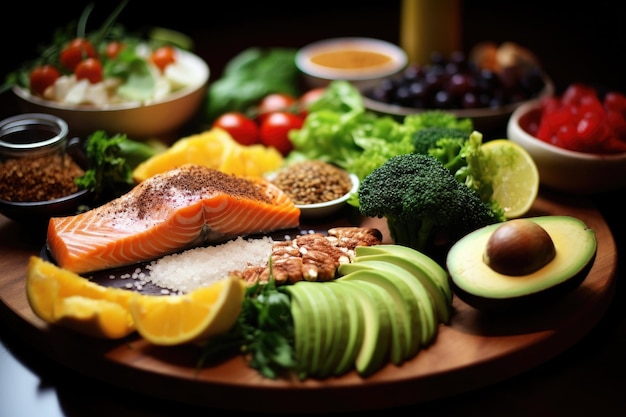
Why Your Diet Is Important
Your dietary choices can have a more significant impact on weight loss than exercise. Studies indicate that diet, or a combination of diet and exercise, affects body composition more than exercise alone. While staying active is crucial for overall health, if you had to choose between diet and exercise to kickstart weight loss, diet would be the more effective option.
Quality Over Quantity
When it comes to diet, the quality of food is often more important than the quantity. A 2018 study found that people who ate plenty of vegetables and whole foods over a year lost weight without restricting calories. Whole, nutrient-rich foods should be a staple in any weight-loss plan.
Fruits for Weight Loss
Fruits are excellent for weight loss due to their high fiber content, which helps you feel full longer. Many fruits also contain flavonoids, compounds that give them their bright colors and offer numerous health benefits, including preventing weight gain. Studies show that people who consume a flavonoid-rich diet experience less weight gain than those who do not, likely because flavonoids decrease fat absorption and increase energy expenditure.
Grapefruit
Grapefruit is a fantastic addition to your breakfast with just 53 calories and two grams of fiber per serving. A 2006 study found that dieters who ate half a grapefruit before each meal experienced significant weight loss after 12 weeks. Some foods, like grapefruit, require more calories to burn than they contain, known as the thermic or metabolic cost of food.
Apples
Apples can satisfy sweet cravings while aiding weight loss. An average apple has about 100 calories and is very filling due to its high fiber (four grams) and water content. One study found that women who ate three apples daily lost weight and consumed fewer calories compared to those who ate three oat cookies daily.
Avocados
Despite their high-fat content, avocados contain healthy monounsaturated fats that do not increase blood triglycerides like saturated fats do. Studies support that monounsaturated fats, particularly from avocados, can assist with weight loss. In one study, overweight adults who ate half an avocado at lunchtime reported a 40% decreased desire to eat for three to five hours afterward.
Bananas
Bananas are high in fiber and low in calories, making them ideal for weight loss. Slightly green bananas have lower sugar content than ripe ones because they contain resistant starch, which helps you feel full longer.
Berries
Berries, including strawberries, blueberries, raspberries, and blackberries, are rich in fiber (up to nine grams per cup) and vitamin C. They are also packed with antioxidants like flavonoids and contain less sugar than many other fruits, making them suitable even for those limiting carbohydrate intake.
Vegetables for Weight Loss
Adding more vegetables to your meals is a great way to increase nutrition while losing weight. Aim to fill half your plate with vegetables at lunch and dinner to benefit from their vitamins and minerals while reducing calorie intake from other foods.
Broccoli
Broccoli is high in fiber, low in calories, and packed with nutrients. One serving of steamed broccoli provides twice the daily recommended amount of vitamins C and K. Broccoli is also a negative-calorie food, meaning it takes more calories to digest than it contains.
Cabbage
Cabbage, another cruciferous vegetable, is high in fiber and water, helping you feel full. It also contains glucosinolates, sulfur-based compounds believed to have anti-cancer properties. Cabbage is an economical choice for weight loss.
Carrots
Carrots are low in calories (50 per cup) and high in fiber (over three grams per serving). They are a good source of vitamin A, which supports vision and immune function, as well as potassium and vitamins C and K.
Cauliflower
Cauliflower is popular in low-carb diets as a rice alternative. It is high in fiber, water, and nutrients, and contains high levels of vitamin C, which helps oxidize fat during moderate exercise, making it a good weight-loss ally.
Tomatoes
Technically a fruit, tomatoes are often used as vegetables in cooking. With just 18 calories per serving and high water content, tomatoes are excellent for weight loss. They contain lycopene, an antioxidant that may protect cells and offer various health benefits. Cherry tomatoes make a great healthy snack.
Other Food Options
Stock up on these weight-loss-friendly foods and pantry staples. They are easy to incorporate into your diet and offer numerous health benefits.
Yogurt
Plain yogurt, especially varieties made from alternative milks like coconut or almond milk, is excellent for weight loss. The probiotics in yogurt support healthy gut bacteria, aiding digestion. Avoid sugary flavored yogurts and consider making your own vegan probiotic yogurt.
Healthy Fats
Not all fats are bad. Olive oil, rich in antioxidants, is one of the healthiest oils and a recommended alternative to butter and saturated fats. Studies show that diets enriched with olive oil can lead to more weight loss than lower-fat diets. Other healthy oils include avocado oil and coconut oil, which increase good HDL cholesterol.
Organic Raw Apple Cider Vinegar
Apple cider vinegar is a popular folk remedy with potential weight-loss benefits. One study found that people who consumed one tablespoon of apple cider vinegar daily for three months lost 2.6 pounds, while those who had two tablespoons lost 3.7 pounds. Use it in salad dressings, smoothies, or add a tablespoon to water with lemon.
Nuts & Seeds
Nuts and seeds are nutritious snacks that combine protein, fiber, and healthy fats. They can satisfy hunger even in small amounts. Almonds and other tree nuts may boost metabolism and assist with weight loss or maintenance.
Green Tea
Green tea is rich in antioxidants and a great beverage for dieters. Studies suggest that green tea can positively affect weight loss and management due to its combination of caffeine and catechins, which may boost metabolism.
Coffee
Enjoy your morning coffee, as it is full of healthy antioxidants and may aid in weight loss and management. The caffeine in coffee is believed to speed up metabolism. Avoid decaf, which removes caffeine and introduces harmful chemicals.
Chili Peppers
If you enjoy spicy foods, chili peppers can help with weight loss. They contain capsaicin, which may help burn extra calories. Consuming as little as 10 mg of capsaicin daily can help burn an additional 50 calories.
Dark Chocolate
In moderation, dark chocolate can be part of a weight-loss diet. Its antioxidants and flavonoids are linked to weight loss. Dark chocolate can help you feel full and satisfy sweet cravings.
Legumes
Legumes, including beans, peas, and lentils, are high in protein and fiber and low in fat. They are a healthy plant-based protein source and may boost metabolism due to the extra calories required for digestion.
Foods to Avoid
Knowing what foods to avoid is just as important as knowing what to eat for weight loss. Here are some foods to steer clear of:
Fast Food
Fast foods are typically high in calories, sodium, and unhealthy fats, which can hinder weight loss and overall health. Regions with more fast food restaurants have higher obesity rates. Opt for “slow food” made with whole, organic ingredients instead.
Pizza
Typical grab-and-go pizza is high in refined carbohydrates, fat, and sodium. Make your own pizza with gluten-free or cauliflower crust, quality sauces, vegan cheese, and healthy toppings.
Sugary Drinks
Many common beverages, including soft drinks, sweetened iced teas, and juices with added sugar, contain high amounts of sugar. Read nutrition labels carefully and choose “no sugar added” versions or make your own juice.
Highly Processed Foods
Highly processed foods often contain refined carbohydrates, high-fructose corn syrup, sugar, and trans fats, which can undermine weight-loss efforts. Stick to whole foods and avoid factory-packaged products.
How to Assemble Your Meal Plan
Instead of following fad diets, create a meal plan with foods that support weight loss. Here are some ideas for healthy eating throughout the day:
Breakfast
Half a grapefruit with raw honey (rich in digestive enzymes), avocado toast on gluten-free bread with sliced tomatoes and extra-virgin olive oil, or a coconut milk yogurt parfait with fresh berries and nuts.
Lunch
Grilled vegetable skewers, lentil vegetable soup, or a green bean salad with quinoa.



